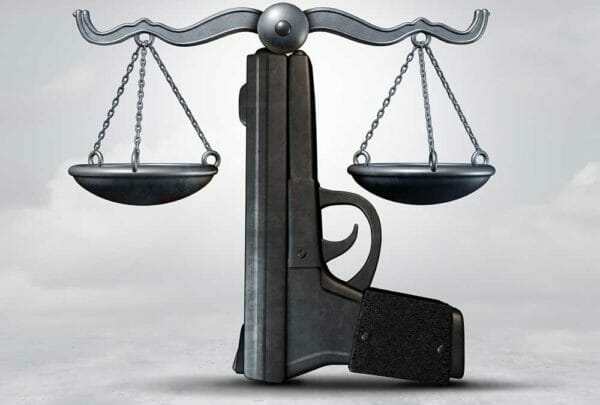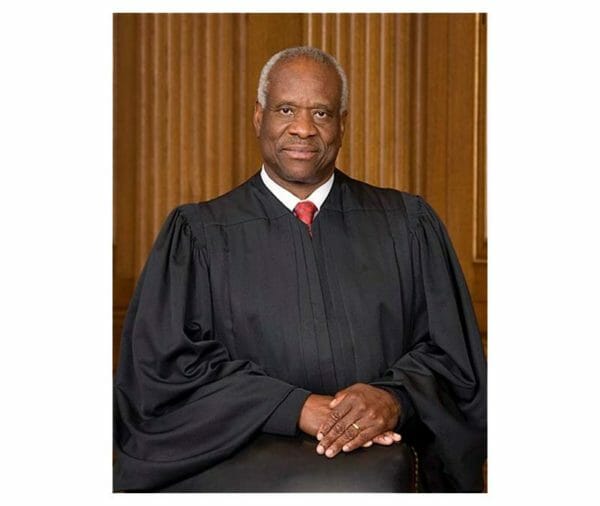
U.S.A. — At least one judge in the Third Circuit believes the Commerce Clause overrides the Bill of Rights.
In a recent decision of The United States Court of Appeals for the Third Circuit, in the case Range v Lombardo, on June 6, 2023, the en banc court ruled some felony convictions are not sufficient to restrict Second Amendment rights, based on the historical record. Eleven of 15 judges concurred with the majority opinion.
Four judges dissented…
One of those dissenting was Judge Janet Richards Roth, appointed to the Third Circuit by George H. W. Bush in 1991. She was born in 1935 and started her governmental career working as a typist and administrative assistant in the Foreign Service of the U.S. Department of State in 1956. She graduated from Harvard Law School in 1965. Judge Roth assumed senior status on May 31, 2006. She is a few days short of her 88th birthday (June 16).
Judge Roth makes a strong case, based on Progressive philosophy, the Commerce Clause overrides the Bill of Rights. She gives the usual litany of Progressive “arguments”: Things have changed since the ratification of the Bill of Rights. The federal government has to have more power than the Bill of Rights allows. That was then. This is now. Here is part of the dissent from Judge Roth of the Third Circuit P. 96 of 107 :
In Bruen, the Supreme Court considered whether a regulation issued by a state government was a facially constitutional exercise of its traditional police power. Range presents a distinguishable question: Whether a federal statute, which the Supreme Court has upheld as a valid exercise of Congress’s authority under the Commerce Clause,2 is constitutional as applied to him. The parties and the Majority conflate these spheres of authority and fail to address binding precedents affirming Congress’s power to regulate the possession of firearms in interstate commerce. Because Range lacks standing under the applicable Commerce Clause jurisprudence, I respectfully dissent.
Judge Roth explicitly states the modern expansion of the commerce clause, to include virtually all activity that has any effect on commerce, overrides the Bill of Rights because the scope of modern commerce is far greater than commerce at the founding.
This case involves the Second Amendment. Roth’s logic could just as easily be applied to the First Amendment and others. Virtually all First Amendment usage involves items that have a connection to interstate commerce – printing presses, telephones, computers, satellites, fiber optic cables, etc. Church pews are made of wood shipped across state lines, paid for by credit cards recognized by interstate banks. Nearly all homes affect interstate commerce. Under the expansive interpretation, the federal government could regulate all use and sale of homes and inspect them at any time, in spite of the Fourth Amendment. Under the expansive, Progressive interpretation, the Ninth and Tenth Amendments are swallowed up. Virtually all of life is encompassed by the absurd extension of the Commerce Clause created by Progressive judges.
Most of what Judge Roth writes about modern times applied to commerce at the time of the ratification of the Bill of Rights.
In U.S. v. Lopez, 1995, the Supreme Court temporarily stepped away from the Commerce Clause abyss into which we have been tumbling. Justice Thomas complained about the Supreme Court failing to follow up on the Lopez decision, instead doubling down on Commerce Clause supremacy over all in the Gonzales v. Raich idiocy. All six judges who voted for Raich (1996) have left the Supreme Court. Only Justice Thomas, who dissented on the case, remains of the justices who were on the court for Raich. From Justice Thomas’ dissent:
Respondents Diane Monson and Angel Raich use marijuana that has never been bought or sold, that has never crossed state lines, and that has had no demonstrable effect on the national market for marijuana. If Congress can regulate this under the Commerce Clause, then it can regulate virtually anything–and the Federal Government is no longer one of limited and enumerated powers
Justice Thomas gives a powerful, originalist, and textualist explanation of the Commerce Clause:
As I explained at length in United States v. Lopez, 514 U.S. 549 (1995), the Commerce Clause empowers Congress to regulate the buying and selling of goods and services trafficked across state lines. Id., at 586—589 (concurring opinion). The Clause’s text, structure, and history all indicate that, at the time of the founding, the term “ ‘commerce’ consisted of selling, buying, and bartering, as well as transporting for these purposes.” Id., at 585 (Thomas, J., concurring). Commerce, or trade, stood in contrast to productive activities like manufacturing and agriculture. Id., at 586—587 (Thomas, J., concurring). Throughout founding-era dictionaries, Madison’s notes from the Constitutional Convention, The Federalist Papers, and the ratification debates, the term “commerce” is consistently used to mean trade or exchange–not all economic or gainful activity that has some attenuated connection to trade or exchange. Ibid. (Thomas, J., concurring); Barnett, The Original Meaning of the Commerce Clause, 68 U. Chi. L. Rev. 101, 112—125 (2001). The term “commerce” commonly meant trade or exchange (and shipping for these purposes) not simply to those involved in the drafting and ratification processes, but also to the general public. Barnett, New Evidence of the Original Meaning of the Commerce Clause, 55 Ark. L. Rev. 847, 857—862 (2003).
Most of the judges on the Third Circuit disagreed with Judge Roth. From the majority opinion concurrence by Judge Porter of the Third Circuit P. 28-29 of 107:
A conception of the Second Amendment right that retcons modern commerce power into early American state law is anachronistic and flunks Bruen’s history-and-tradition test. Setting the federal floor through a combination of antebellum state police power and Congress’s post-New Deal commerce authority, as the dissents propose, would underprotect the constitutional right to keep and bear arms.
The modern Supreme Court is stepping back from the Progressive position of all power to the administrative state. The Supreme Court may finally reinstate limits on what the Commerce Clause covers. Justice Thomas has explicitly shown what those limits should be.

About Dean Weingarten:
Dean Weingarten has been a peace officer, a military officer, was on the University of Wisconsin Pistol Team for four years, and was first certified to teach firearms safety in 1973. He taught the Arizona concealed carry course for fifteen years until the goal of Constitutional Carry was attained. He has degrees in meteorology and mining engineering, and retired from the Department of Defense after a 30 year career in Army Research, Development, Testing, and Evaluation.







That judge should be impeached for deliberately misconstruing the purpose of the Commerce Clause. No part of the Constitution was ever intended to hold higher authority than the Bill of Rights, for if that were so the South would still have slaves today!
That is why Commi-demonrats are doing everything possible to stab Justice Thomas in the back.
Yes, thank God for Clarence Thomas. Getting so the Commerce Clause would have its own flag, and its own army.
The woman is an idiot
Government thugs have been using the commerce clause to violate rights for almost a century.
While your opinion can differ from SCOTUS decisions on certain items, it is not your job to defy that court and try to end run it with an unconstitutional ruling of your own. The whole progressive strategy is to force the people to run up through the court system – something which takes years, to be able to get their rights by a higher court. Even then, states like CA and NY outright refuse to comply, leaving another court battle that should never have happened in the first case. I say roll in and collect these folks to liquidation at… Read more »
it is a real stretch use the commerce clause to say a person can or cannot possess a firearm once the purchase has been completed. at that time inter-state commerce has ceased, and if legally allowed in that state that should be the end of that matter.
i chalk it up to senility, just like ol’ joe, jumping straight into the despot role.
i believe there comes a time when age becomes an impediment to governance, and this is one of those times, again like ol’ joe.
Sounds like this addled old gal needs to retire.
Give her a trial for sedition and treason and let her pick her method of execution. Maybe hemlock will be her choice. After all, she has introduced a new god into the equation. Her god is the state she represents. The state of insanity. Typical of what you would expect from a psychopathic control freak parasite. My description is getting longer by the week. I’ll need to abbreviate to PSCP.
Using her logic (or lack thereof), if someone makes a firearm in one state, made completely from items obtained in that same state, the Commerce Clause wouldn’t apply.